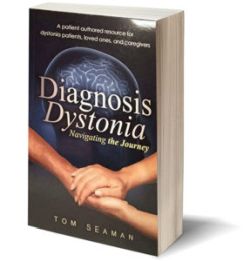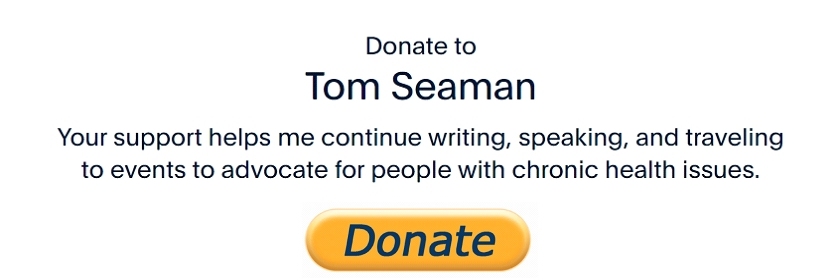How much self-care is too much?
If you have read my books or articles, you have probably noticed that I talk about self-care quite a bit. I think self-care is extremely important for anyone, whether they have a health condition or not. For me, self-care took on a whole new meaning when I began living with a neurological movement disorder called dystonia in 2001. It then became more of my daily life after a bad back injury last summer, from which I have still not recovered. But how much is too little or too much self-care? Can we go too far with it? I believe we can, to the point of it being bad for us.

To expand upon my above comments, too little self-care is not going to help and too much sends a powerful message to our brains that there is something wrong with us. This can be very detrimental to our potential for healing and recovery. The same thing can be said for going to the doctor too often, or too many doctors, to try and find out all the different things that are wrong with us. Each visit is a reminder to our brain that something is wrong. The more we send this message to our brain, the more we begin to identify with our health problem. It is an ongoing loop.

I think it’s important that we incorporate self-care into our lives and go to necessary doctor appointments, but sometimes we can overdo it. If we are frequently going to different doctors for different issues, every single step along the way to get to that doctor from the paperwork all the way to the follow up is not only stressful and time consuming, it further reminds us that we have a problem or MIGHT have a problem. Too much time at Doctor Google is also not in our best interest.
Why feed worry until there is something to truly worry about? I often chuckle at the notion of “Wellness Visits,” because why would we go to the doctor if we feel good? Of course I understand the meaning behind them, but as someone who has to see doctors on a somewhat regular basis for medication refills and other unavoidable treatments, the idea of a wellness visit seems silly.

With too much self-care and too many doctor visits, we are training ourselves to take on the identity of a sick or injured person. I have fallen into this trap many times doing self-care activities when I don’t always need to do them, simply because they have become part of my daily lifestyle and routine. When I loosen my routine, I often find that I feel just as good and sometimes even better. My self-care routine can sometimes become so rigid that it makes me feel more stress and less healthy. At one point, I also took a break from all of my doctors because I was feeling worse the more I went.

I have a friend with a variety of different symptoms that nobody has been able to diagnose. It seems like she has had pretty much every test under the sun. Every time she goes to the doctor and they can’t figure out what’s wrong and nothing shows up on a test, she seeks out another specialist until she finds the answer. She has still not found one and her hypervigilance is creating more stress-related problems with her health and relationships.
Without realizing it, she is pursuing a disease. She wants a label. She wants a reason. She wants it so badly that she will go to any length to get that reason. But it has yet to come to her and she still struggles to pull back and take a break for a while and enjoy life the best she can. Interestingly, and I try to point this out to her, when she is not always worrying about what’s wrong, when her mind is distracted, when she is in a good mood, and when she has fewer doctor visits, she ALWAYS feels better. But her desire to find out why she has x,y,z symptoms overrules this too much.

We all need to find the right balance, so I think we all need to assess just how much self-care we need and how much is too much or too little. The same applies to doctor visits. Sometimes just going about our lives as if nothing is wrong with us, which I know can be very hard to do, is the best medicine.
Please take a look at your life and see if you are paying too much attention to your health, or maybe not enough attention to your health. Be mindful of how much you are pursuing self-care and care from outside sources. By all means, make sure you are being responsible and seek out doctors when absolutely necessary, but if possible, pulling away from the medical system mayhem to stop reminding yourself that you are sick might be in your best interest.

Two final comments… be careful how much time you spend on health-related support groups. Reading stories and comments from others who are struggling can be overwhelming, and another reminder to us that we have something wrong as well. I have said this before in articles and books, and I want to say it again – we all have more right with us than we have wrong with us, so we need to shift our focus and be grateful for all we have and can do. This shift can very much down-regulate pain and our overactive sympathetic (fight/flight) nervous system.
I know many people who say they don’t want to be sick or injured or live with a long-term impairment like I have with dystonia, but they unknowingly pursue this identity with an overabundance of doctor visits and too much self-care. Please take a look at your life and see if this applies to you and if so, try to make some modifications.
 Tom Seaman is a Certified Professional Life Coach in the area of health and wellness, and the author of 2 books: Diagnosis Dystonia: Navigating the Journey and Beyond Pain and Suffering: Adapting to Adversity and Life Challenges. He is also a motivational speaker, chronic pain and dystonia awareness advocate, health blogger, volunteer for the Dystonia Medical Research Foundation (DMRF) as a support group leader, and is a member and writer for Chronic Illness Bloggers Network, The Mighty, and Patient Worthy. To learn more about Tom, get a copy of his books (also on Amazon), or schedule a free life coaching consult, visit www.tomseamancoaching.com. Follow him on Twitter @Dystoniabook1 and Instagram.
Tom Seaman is a Certified Professional Life Coach in the area of health and wellness, and the author of 2 books: Diagnosis Dystonia: Navigating the Journey and Beyond Pain and Suffering: Adapting to Adversity and Life Challenges. He is also a motivational speaker, chronic pain and dystonia awareness advocate, health blogger, volunteer for the Dystonia Medical Research Foundation (DMRF) as a support group leader, and is a member and writer for Chronic Illness Bloggers Network, The Mighty, and Patient Worthy. To learn more about Tom, get a copy of his books (also on Amazon), or schedule a free life coaching consult, visit www.tomseamancoaching.com. Follow him on Twitter @Dystoniabook1 and Instagram.



























Thank you Tom once again for a very insightful and helpful article. I too suffer from Cervical Dystonia and too often let it take over my entire life. Stay strong and keep encouraging us. Thanks again
Hi Lynne. You’re welcome. It’s very hard for it to not take over our lives. We do the best we can and it is important to acknowledge ourselves for those efforts
Thank you, Tom!
I really needed this message. I live with cervical dystonia which also causes chronic tension headaches and like your friend I also have a mystery illness with a myriad of symptoms, but you are so spot on and I have started to come to this conclusion myself, as of late.
P.s. I think you know more about dystonia than my doctor.
Thanks so much for sharing your thoughts on this and what you have experienced. I think that most of us go through what you described. I think most of us need to go through what you described. Sometimes I think it feels like we need to continue pursuing or else we are slacking off or we are not advocating for ourselves, but oftentimes we can push too much and make things worse.